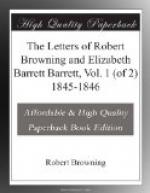Yes—and it does delight me to hear of your garden full of roses and soul full of comforts! You have the right to both—you have the key to both. You have written enough to live by, though only beginning to write, as you say of yourself. And this reminds me to remind you that when I talked of coveting most the authorship of your ‘Pippa,’ I did not mean to call it your finest work (you might reproach me for that), but just to express a personal feeling. Do you know what it is to covet your neighbour’s poetry?—not his fame, but his poetry?—I dare say not. You are too generous. And, in fact, beauty is beauty, and, whether it comes by our own hand or another’s, blessed be the coming of it! I, besides, feel that. And yet—and yet, I have been aware of a feeling within me which has spoken two or three times to the effect of a wish, that I had been visited with the vision of ‘Pippa,’ before you—and confiteor tibi—I confess the baseness of it. The conception is, to my mind, most exquisite and altogether original—and the contrast in the working out of the plan, singularly expressive of various faculty.
Is the poem under your thumb, emerging from it? and in what metre? May I ask such questions?
And does Mr. Carlyle tell you that he has forbidden all ‘singing’ to this perverse and froward generation, which should work and not sing? And have you told Mr. Carlyle that song is work, and also the condition of work? I am a devout sitter at his feet—and it is an effort to me to think him wrong in anything—and once when he told me to write prose and not verse, I fancied that his opinion was I had mistaken my calling,—a fancy which in infinite kindness and gentleness he stooped immediately to correct. I never shall forget the grace of that kindness—but then! For him to have thought ill of me, would not have been strange—I often think ill




